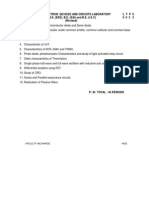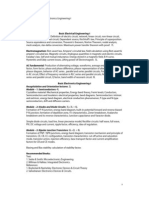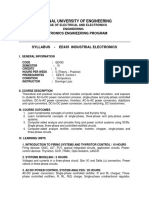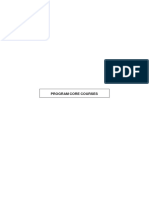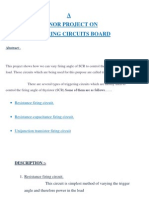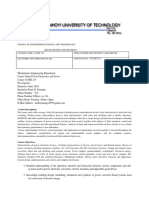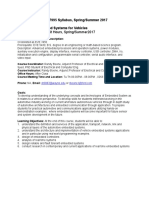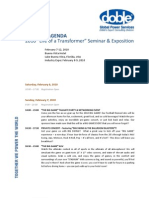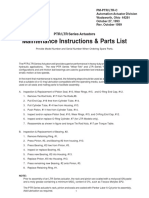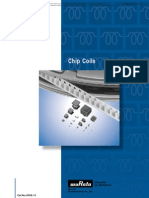Power Electronics (CT318)
Power Electronics (CT318)
Uploaded by
Timothy FieldsCopyright:
Available Formats
Power Electronics (CT318)
Power Electronics (CT318)
Uploaded by
Timothy FieldsOriginal Description:
Copyright
Available Formats
Share this document
Did you find this document useful?
Is this content inappropriate?
Copyright:
Available Formats
Power Electronics (CT318)
Power Electronics (CT318)
Uploaded by
Timothy FieldsCopyright:
Available Formats
62
Subject
Power Electronics
Course Code CT318 Theoretical 3hrs / wk
Semester 5 Prerequisite CT217 Practical 3hrs / wk
Program Learning Component
1. Understands the power electronic devices, and its firing and protection techniques.
Week
1-3
Practical Resources Specific Learning Outcomes
By experimentthe student
should verify
Interpreting the data sheets
for power electronic
devises.
Interpreting the diode
characteristics and diode
testing,
Interpreting thyristor
characteristics and
thyristor testing.
A computer &
data-show.
White board
Power electronics and power
electronic devices:
Explains PN junction, power diode
and draws its characteristics.
Defines their applications.
Power transistors (BJT, MOSFET,
IGBT,etc).
Explains operation and protection of
power transistors.
Explains thyristor (SCR, traic, Gto,
etc).Draws firing and protection
circuits for thyristors.
Operational Amplifier circuits
2. Able to determine the average value of the output voltage and current. Exams
the effect of the inductive load on the rectification process.
Week
4-5
Practical Resources Specific Learning Outcomes
By experiment the student
should verify:
Operation of thyristor
firing circuits.
Single phase controlled
rectifier with resistive
load.
Demonstrates effect of
inductive load on the
single phase controlled
rectifier.
A computer &
data-show.
White board
Power electronics circuits
(controlled)
Thyristors : characteristics, turn-on,
turn-off, snubber circuits, firing
circuits, single phase half-wave
semi-converter, full converter, dual
converter, resistive and inductive
loads, three phase converters
63
Three phase controlled
rectifier with resistive
load.
3. Understands the AC voltage controller.
Week
7 - 6
Practical Resources Specific Learning Outcomes
By experiment the student
should verify:
Speed control of AC motor
using phase controllers.
Speed control of universal
motor using a traic.
3- Build a test control
circuits.
A computer &
data-show.
White board
AC voltage controllers
On-off control, single phase
unidirectional, bi-directional, with
inductive loads, three phase half-
wave, full-wave cyclo-converters.
4. Understands the theory of operation of different types of chopper circuits.
Week
9 - 8
Practical Resources Specific Learning Outcomes
By experiment the student
should verify:
Speed control of DC motor
using choppers.
Build a test circuits
chopper circuits.
A computer &
data-show.
White board
Choppers
Power transistors: characteristics,
series and parallel operation,
dt
di
and
dt
dv
limitations, isolation of gate and
base drives, step-up and step-down
chopper operation, classification,
regulators, thyristors chopper
circuits.
5. Understands the theory of operation of inverters with the control of voltage
and frequency
Week
12 - 10
Practical Resources Specific Learning Outcomes
By experiments the
student should verify:
Speed control of DC
motors using controlled
rectifier circuits
(Thyristors).
Build a test control circuit.
A computer &
data-show.
White board
Inverters
Principle of operation, performance
parameters, single phase and three
phase PWM inverters.
Week
64
Practical Resources Specific Learning Outcomes 14 - 13
Troubleshooting and
maintenance of power
supply and checking
power electronic devices
A computer &
data-show.
White board
Introduction to linear and switching
mode Power supplies and the AC
voltage stabilizer circuits.
You might also like
- 575 Maranello Error P CodesDocument906 pages575 Maranello Error P CodesDamien Jorgensen100% (2)
- CBLM - Assemble Electronic ProductsDocument40 pagesCBLM - Assemble Electronic ProductsReynald Apostol100% (2)
- PWR-9-EE 368 Power ElectronicsDocument2 pagesPWR-9-EE 368 Power Electronicsbilal nagoriNo ratings yet
- EE 471: Power Electronics: Schedule SemesterDocument4 pagesEE 471: Power Electronics: Schedule SemesterHafsa IjazNo ratings yet
- Course Outline: Electrical Machines Technology ProgramDocument3 pagesCourse Outline: Electrical Machines Technology ProgramAhas AlqNo ratings yet
- Electrical Machines OBE, Clo Plo.Document4 pagesElectrical Machines OBE, Clo Plo.Awais KhanNo ratings yet
- EES401 Power Electronics Course Outline-Unit PlanDocument4 pagesEES401 Power Electronics Course Outline-Unit PlanPaul KuleiNo ratings yet
- PE Lab Manual - 21EEL55 - FinalDocument46 pagesPE Lab Manual - 21EEL55 - FinalAshwini0% (1)
- FEE 541 Power Electronics and VFDsDocument3 pagesFEE 541 Power Electronics and VFDsOpapa PeterNo ratings yet
- Basic Eletrical Engineering 1Document5 pagesBasic Eletrical Engineering 1krishnaneupane1093No ratings yet
- 10ec73 Power Electronics Vtu SyllabusDocument2 pages10ec73 Power Electronics Vtu SyllabusYaichenbaPebam100% (1)
- Chap 1. Class - 1Document16 pagesChap 1. Class - 1Tolesa ShoreNo ratings yet
- 3710713-Power Electronics & ApplicationDocument3 pages3710713-Power Electronics & ApplicationTanvi IsraniNo ratings yet
- Sub Engg Annexure-II PDFDocument3 pagesSub Engg Annexure-II PDFRacherla Mega RaniNo ratings yet
- Concept of Power ElectronicsDocument23 pagesConcept of Power ElectronicsMuttoju VaishnaviNo ratings yet
- B.E Semester: IV Electrical Engineering: Power Semi-Conductor DevicesDocument2 pagesB.E Semester: IV Electrical Engineering: Power Semi-Conductor Devicesvatsalshah24No ratings yet
- 2008 Chennai LabDocument40 pages2008 Chennai Labsulthan_81No ratings yet
- 503Document2 pages503ahmad16_ftua6999No ratings yet
- Course Plan Ee3007 Power ElectronicsDocument1 pageCourse Plan Ee3007 Power ElectronicszapzahtNo ratings yet
- V Ex (Sy) 290911035844Document2 pagesV Ex (Sy) 290911035844kailash_singh_7No ratings yet
- Applied Industerial Chapter 1Document59 pagesApplied Industerial Chapter 1onkaliyaNo ratings yet
- Rec SemiDocument20 pagesRec SeminadirNo ratings yet
- PDFDocument4 pagesPDFRishiNo ratings yet
- EE 209: Electrical/Electronics Lab MM 215: Experimental and Measurements LaboratoryDocument15 pagesEE 209: Electrical/Electronics Lab MM 215: Experimental and Measurements LaboratoryAbhishek KumarNo ratings yet
- Solar Technician Test Preparation Guide, 3-2023Document11 pagesSolar Technician Test Preparation Guide, 3-2023EstebanBadillaAlvaradoNo ratings yet
- Festo Certification Program Guide ElectricityDocument1 pageFesto Certification Program Guide ElectricitywangemaimaNo ratings yet
- Eee 304 Lecture Notes - 1Document171 pagesEee 304 Lecture Notes - 1Haritha RkNo ratings yet
- Curriculum Circuits LabDocument1 pageCurriculum Circuits LabKarthik ThirumalaNo ratings yet
- Testing of Solar InvertersDocument38 pagesTesting of Solar InvertersVignesh KumarNo ratings yet
- Syllabi - EE 5004 - Power ElectronicsDocument2 pagesSyllabi - EE 5004 - Power ElectronicsKalum ChandraNo ratings yet
- Introduction To Power ElectronicsDocument9 pagesIntroduction To Power ElectronicsSathiya NathanNo ratings yet
- Introduction To Power ElectronicsDocument9 pagesIntroduction To Power ElectronicsSathiya NathanNo ratings yet
- Advanced Power Semiconductor DevicesDocument2 pagesAdvanced Power Semiconductor DevicesMani Vannan Soundarapandiyan100% (3)
- Refurbishment Power Engieneeting Electrical LappiesDocument5 pagesRefurbishment Power Engieneeting Electrical LappiesMohd AzlanNo ratings yet
- A-M RFP Indt TRGDocument17 pagesA-M RFP Indt TRGapi-245222092No ratings yet
- Power Electronics and Industrial DrivesDocument3 pagesPower Electronics and Industrial Drivesvatsalshah24No ratings yet
- Ee001 Power Generation Systems: L T P CDocument32 pagesEe001 Power Generation Systems: L T P CPARTH DAVENo ratings yet
- Power Electronics E-624Document3 pagesPower Electronics E-624eta0% (1)
- Ae312 Power ElectronicsDocument2 pagesAe312 Power ElectronicsYOHIN RAPHELNo ratings yet
- Basic Electrical Engineering Laboratory Manual 3Document103 pagesBasic Electrical Engineering Laboratory Manual 3তনুশ্রী সরকারNo ratings yet
- Power Electronics SeminarDocument25 pagesPower Electronics Seminarsreemukhi100% (3)
- 29 ML839 Power ElectronicsDocument2 pages29 ML839 Power Electronicsjimmy jimenez barriosNo ratings yet
- Lecture1 Syllabus IntroDocument21 pagesLecture1 Syllabus Introperumburesuresh3762No ratings yet
- Ee6611 Power Electronics and DrivesDocument65 pagesEe6611 Power Electronics and DrivesNilambari BhaviniNo ratings yet
- PowerElec-Course Outline Intro Assign1Document15 pagesPowerElec-Course Outline Intro Assign1Ndunya WestleyNo ratings yet
- VI Sem SyllabusDocument8 pagesVI Sem Syllabussai jagatheeswaranNo ratings yet
- 10ec73 Power Electronics Vtu SyllabusDocument2 pages10ec73 Power Electronics Vtu SyllabusYaichenbaPebamNo ratings yet
- ES101 - Baisc Electrical & Electronics EngineeringDocument2 pagesES101 - Baisc Electrical & Electronics EngineeringMyWBUT - Home for EngineersNo ratings yet
- Edc Syllabus Based On BOsDocument3 pagesEdc Syllabus Based On BOsnandhakumarmeNo ratings yet
- List of Experiment OISTDocument14 pagesList of Experiment OISTDr-Nikita Shivhare MitraNo ratings yet
- 0 Power Electronics - Lecture Plan - 2021-22Document1 page0 Power Electronics - Lecture Plan - 2021-22OmkarNo ratings yet
- II Year I Semester L T P C 0 0 3 1.5Document7 pagesII Year I Semester L T P C 0 0 3 1.5eee.hodNo ratings yet
- Math S OppDocument34 pagesMath S Opppaudelhimachal123No ratings yet
- Asst Engineer Exam 2016Document7 pagesAsst Engineer Exam 2016Vidya Sagar KallaNo ratings yet
- Que-Write A Short Note On: I. Circuit Breakers Rating, Ii. Testing of CB, Iii. Point On Wave Switching Iv. Selection of Circuit BreakersDocument9 pagesQue-Write A Short Note On: I. Circuit Breakers Rating, Ii. Testing of CB, Iii. Point On Wave Switching Iv. Selection of Circuit Breakersrityalonare21No ratings yet
- L209 EE435 Industrial ElectronicsDocument2 pagesL209 EE435 Industrial Electronicslnn97No ratings yet
- AKU Patna Syllabus 3rd YearDocument20 pagesAKU Patna Syllabus 3rd Yearडाँ सूर्यदेव चौधरीNo ratings yet
- Minor SCR - day15NOVDocument8 pagesMinor SCR - day15NOVRavi ShankarNo ratings yet
- Power Electronics and DrivesDocument3 pagesPower Electronics and DrivesAsprilla Mangombe100% (1)
- Power Electronics: Lecture Notes of Power Electronics CourseFrom EverandPower Electronics: Lecture Notes of Power Electronics CourseNo ratings yet
- Power Electronics and Energy Conversion Systems, Fundamentals and Hard-switching ConvertersFrom EverandPower Electronics and Energy Conversion Systems, Fundamentals and Hard-switching ConvertersNo ratings yet
- Electrical Machines: Lecture Notes for Electrical Machines CourseFrom EverandElectrical Machines: Lecture Notes for Electrical Machines CourseNo ratings yet
- Industrial DevelopmentDocument221 pagesIndustrial DevelopmentTimothy FieldsNo ratings yet
- Course Contets 151 Units ProgramDocument16 pagesCourse Contets 151 Units ProgramTimothy FieldsNo ratings yet
- Olympus Epoch XTDocument8 pagesOlympus Epoch XTTimothy FieldsNo ratings yet
- Liceet 2018 Paper 128Document5 pagesLiceet 2018 Paper 128Timothy FieldsNo ratings yet
- Ontrol Ystems Ociety: Publications Content DigestDocument11 pagesOntrol Ystems Ociety: Publications Content DigestTimothy FieldsNo ratings yet
- Speed Monitor PDFDocument30 pagesSpeed Monitor PDFTimothy FieldsNo ratings yet
- 2013 Engineering MagazineDocument28 pages2013 Engineering MagazineTimothy FieldsNo ratings yet
- TURCK Ultrasonic SensorsDocument2 pagesTURCK Ultrasonic SensorsTimothy FieldsNo ratings yet
- Simatic St80 Add Ons Complete English 2015 OkDocument28 pagesSimatic St80 Add Ons Complete English 2015 OkTimothy FieldsNo ratings yet
- AC Drives: Siemens STEP 2000 CourseDocument37 pagesAC Drives: Siemens STEP 2000 CourseTimothy FieldsNo ratings yet
- Exam2 (Review Slides) PDFDocument8 pagesExam2 (Review Slides) PDFTimothy FieldsNo ratings yet
- CTACDocument13 pagesCTACTimothy FieldsNo ratings yet
- Che 436 Competencies For Exam 2: Level 3Document8 pagesChe 436 Competencies For Exam 2: Level 3Timothy FieldsNo ratings yet
- Consultancy ProjectsDocument3 pagesConsultancy ProjectsTimothy FieldsNo ratings yet
- Training IEC CE For Control Panels - April 2014 PDFDocument195 pagesTraining IEC CE For Control Panels - April 2014 PDFTimothy Fields100% (3)
- Fellowship Application 2016 enDocument3 pagesFellowship Application 2016 enTimothy FieldsNo ratings yet
- Mobilizare Pasiva SoldDocument1 pageMobilizare Pasiva SoldTimothy FieldsNo ratings yet
- GSSScholarship 2017 enDocument4 pagesGSSScholarship 2017 enTimothy FieldsNo ratings yet
- Industrial AutomationDocument33 pagesIndustrial AutomationTimothy FieldsNo ratings yet
- Conventional Audible Visual Devices: Signal BeaconsDocument2 pagesConventional Audible Visual Devices: Signal BeaconsOvidiu GavrilasNo ratings yet
- Wiring MicoDocument83 pagesWiring MicoSopyan Permana100% (1)
- ECE 7995-Embedded Systems For Vehicles-Syllabus S17 - v2Document6 pagesECE 7995-Embedded Systems For Vehicles-Syllabus S17 - v2AsraButoolNo ratings yet
- Basic Engineering Measurement AGE 2310Document21 pagesBasic Engineering Measurement AGE 2310ahmed gamalNo ratings yet
- Tripp Lite Owners Manual 753551Document48 pagesTripp Lite Owners Manual 753551Benjamin BechtelNo ratings yet
- Seminar Agenda: 2010 "Life of A Transformer" Seminar & ExpositionDocument13 pagesSeminar Agenda: 2010 "Life of A Transformer" Seminar & ExpositionRoopa PatelNo ratings yet
- ManualPioneer (Deh 4350ub) (Deh 3350ub)Document72 pagesManualPioneer (Deh 4350ub) (Deh 3350ub)Yohel LaghunaNo ratings yet
- RC Snubber Design in Synchronous Buck ConverterDocument3 pagesRC Snubber Design in Synchronous Buck ConvertersnvvNo ratings yet
- 200 - 450 MHZ Quadrature Hybrid Using Lange Coupler - ReportDocument22 pages200 - 450 MHZ Quadrature Hybrid Using Lange Coupler - ReportAmador Garcia IIINo ratings yet
- Dolby LevelDocument3 pagesDolby LevelSteveDFNo ratings yet
- Maintenance Instructions & Parts List: PTR/LTR Series ActuatorsDocument8 pagesMaintenance Instructions & Parts List: PTR/LTR Series Actuatorswaltsantos10No ratings yet
- Embedded Systems Engineering Lecture 08 (UART)Document28 pagesEmbedded Systems Engineering Lecture 08 (UART)Nushara WedasinghaNo ratings yet
- Manual ViplexDocument64 pagesManual ViplexJUAN FRANCISCO MEJ�A MERCADONo ratings yet
- Canadian Solar Datasheet MaxPower CS6X P V5.5enDocument2 pagesCanadian Solar Datasheet MaxPower CS6X P V5.5enjugal8252No ratings yet
- En - stm32L4 Peripheral LCDDocument25 pagesEn - stm32L4 Peripheral LCDPareekshith PNo ratings yet
- Distance Protection Algorithm For Double-Circuit Transmission Line With Fault Resistance CompensationDocument7 pagesDistance Protection Algorithm For Double-Circuit Transmission Line With Fault Resistance Compensationab_7178No ratings yet
- SRVCC To UMTS HO Implementation in 3GDocument6 pagesSRVCC To UMTS HO Implementation in 3GbalamuruganNo ratings yet
- DatasheetDocument86 pagesDatasheetOnsirin N NuchsopaNo ratings yet
- GA-FC Owners ManualDocument2 pagesGA-FC Owners ManualGaryNo ratings yet
- TP48200A-HT19C4-1 and TBC300A-TCA2 Telecom Power User ManualDocument94 pagesTP48200A-HT19C4-1 and TBC300A-TCA2 Telecom Power User Manualmiguel.peredaNo ratings yet
- Maglite Solitaire REPAIRDocument2 pagesMaglite Solitaire REPAIRsauldalinskyNo ratings yet
- Chapter 4 - Electrical Plan and InstallationDocument31 pagesChapter 4 - Electrical Plan and InstallationFikaduNo ratings yet
- Kendriya Vidyalaya No.1 Cuttack: Physics Investigatory Project (2023-24)Document14 pagesKendriya Vidyalaya No.1 Cuttack: Physics Investigatory Project (2023-24)arequest9777No ratings yet
- SSP 225 Electro-Mechanical PS SystemDocument24 pagesSSP 225 Electro-Mechanical PS Systemภูเก็ต เป็นเกาะNo ratings yet
- 03 - Communication Systems + Class ActivityDocument19 pages03 - Communication Systems + Class ActivityputerisuhanaNo ratings yet
- Comparison Between Load-Flow Analysis Methods in Power SystemDocument8 pagesComparison Between Load-Flow Analysis Methods in Power SystemnpfhNo ratings yet
- TSUMV59XU DatasheetDocument33 pagesTSUMV59XU DatasheetMuhammad Shamrez89% (9)
- Electro-Thermal Model of Lithium-Ion Batteries For Electrified Vehicles ApplicationsDocument5 pagesElectro-Thermal Model of Lithium-Ion Batteries For Electrified Vehicles ApplicationsTamil SelvanNo ratings yet
















